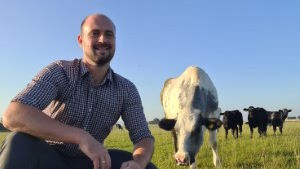SQP Profiles - Matthew Busby - Business Development Manager, Mole Country Stores, Buckinghamshire

Having grown up on the family dairy and pig
farm in rural Berkshire,
and later an arable farm in Gloucestershire, Matthew’s
career in animal health started after he finished school, where he worked for a
local agricultural merchant.
“Working in the agri-supply industry kick
started my career in animal health and presented an opportunity to educate
myself on how to best assist and support farmers with their animal health needs,”
Matthew shares.
As a natural progression, Matthew trained to
become a RAMA in 2010, spending the next ten years working in the ruminant pharmaceutical
industry, working with farmers, RAMAs (SQPs) and vets.
“In 2018 I did my NOAH Certificate of Animal
Health qualification (NCAH), before joining Mole Valley in 2021,” says
Matthew.
Matthew was keen to add to his skill set,
whilst providing high quality advice and being able to prescribe the right
medicines to his customers. Becoming an AMTRA RAMA enabled him to achieve this.
“As a
Business Development Manager for Mole Valley, a typical day for me involves
on-farm visits to clients across Buckinghamshire, Oxon and Northants, catering
for all their agricultural supply requirements,”
explains Matthew.
“I enjoy spending time
on-farm as it gives me the opportunity to apply the skills I’ve learned to real situations, providing
advice on animal health, prescribing animal medicines, or supporting customers
with the supply of equipment, animal feed, and much more,” Matthew adds.
According to Matthew, one of the most important aspects
of a RAMAs role is to have a positive influence on the mindset of farmers, instilling
confidence that the solutions provided are the right ones for their individual circumstances
and livestock.
“AMTRA has an
excellent selection of training providers offering multiple CPD opportunities. I
regularly undertake CPD to be certain that the information I am sharing is up-to-date
and to ensure all prescriptions I provide are done so with the relevant
knowledge,” says Matthew.
“I still believe that
the RAMA qualification is not fully appreciated by some farmers. The only way
to combat this is to build trust, show your professionalism, and hopefully,
over time their mindsets will sway,” he
says.
Matthew believes communication is essential in order to
understand the individual requirements and what animal health issues or
diseases they are dealing with on-farm.
“Broad knowledge of diseases
is essential to offer the appropriate solution and prescribe a suitable
medicine,” Matthew explains.
“I always prefer
visiting clients on-farm to understand the bigger picture of what is happening.
In store customers are often more rushed, so the time we have with them is
limited,” says Matthew.
“We are taking steps
to improve the effectiveness of farmers’
time spent visiting the store by recently investing in a FEC kit, which is
encouraging livestock producers to provide faecal samples pre and post
treating,” adds Matthew.
Matthew also stresses that when it comes to
animal medicines, AMTRA RAMAs are not just selling a product, they are
delivering qualified and professional advice, and this is particularly relevant
as we head towards the autumn when changing climates can cause the spread of
disease.
By September, the fly season should be nearing an end,
but with unpredictable weather it can be a challenge to determine what farmers will
need to focus on during the autumn.
“If the weather stays warmer,
farmers should continue taking precautions to prevent blowfly strike. If the
weather turns wetter, we could be looking towards liver fluke and lungworm
treatments,” Matthew advises.
During August and September, sheep sales will ramp up
again, and it is essential to fully inspect the animal before bringing them back
to the farm, minimising the risk of disease spreading.
“Farmers need to be
looking to worm appropriately with an effective wormer and cover themselves on
sheep scab. Quarantine with new animals is key to preventing the spread of
disease,” Matthew concludes.
Matthew can be reached on 07860 206564 or at [email protected]